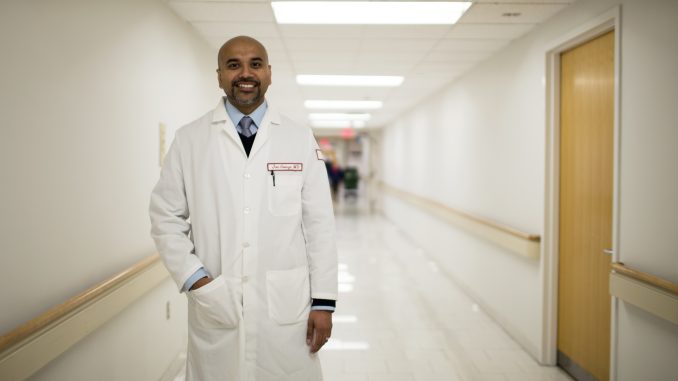
Temple University Hospital is the only hospital in the Philadelphia area to run a clinical trial for end-stage heart failure (ESHF). Dr. Jon C. George, an interventional cardiologist and an adjunct assistant professor at the Temple School of Medicine, is the local principal investigator of the clinical trial.
George said the nationwide trial is focused on enhancing the quality of life for individuals suffering from heart failure with ischemic dilated cardiomyopathy (IDCM).
The hearts of patients affected by IDCM have a harder time pumping blood because the main pumping chamber – the left ventricle – is enlarged, weak and dilated, George said. This is caused by coronary artery disease and heart attacks and makes it difficult for the flow of blood to reach the heart muscle.
George became the local principal investigator for the trial based on his experience, prior involvement in clinical trials and years spent researching stem cell research.
The trial – called ixCELL DCM – focuses on stem cells because they can do a variety of functions.
“[The trial] uses stem cells to regenerate the flow of blood vessels into the diseased area of the heart,” George said. “A part of it is to recreate blood flow and regenerating heart muscle. It’s primarily supposed to focus on regeneration.”
George is investigating whether a patient’s stem cells can improve his or her blood flow.
The trial passed the first phase, which George said is “a safety evaluation to make sure treatment is safe” and is currently heading into the second phase to see if the study is effective.
“As far we we’re concerned the trial is just getting started for us,” George said. “We have at least three patients scheduled to go within the next month and were not sure of the total we’ll have.”
The trial does not accept patients who are candidates for a heart transplant, meaning that they are either too sick or not sick enough to fit the criteria.
Those who pass the clinical criteria will have stem cells removed from their bone marrow and sent to a lab for enhancing.
The doctors working the trial will use NOGA, a mapping tool, to pinpoint the exact locations in the heart that are damaged.
After the stem cells return from the lab, about two weeks later, they are injected into surrounding damaged areas.
Patients will then have 12 months of health monitoring follow-up visits that include different checkups, like a walk test, echocardiograms and quality of life measurements.
The results will be analyzed to determine if the group that received the stem cell treatment have an improved heart function, lower mortality and a lower number of hospitalizations.
“The goal is to basically improve their heart failure status enough so that they stay out of the hospital,” George said.
Heart failure caused by IDCM can force patients to visit hospital emergency rooms regularly.
“The hope is to reduce the number on the transplant list,” George said. “A lot of patients are on the waiting list for transplants and a lot of patients die waiting for the transplant.”
Jane Babian can be reached at jane.babian@temple.edu



Be the first to comment